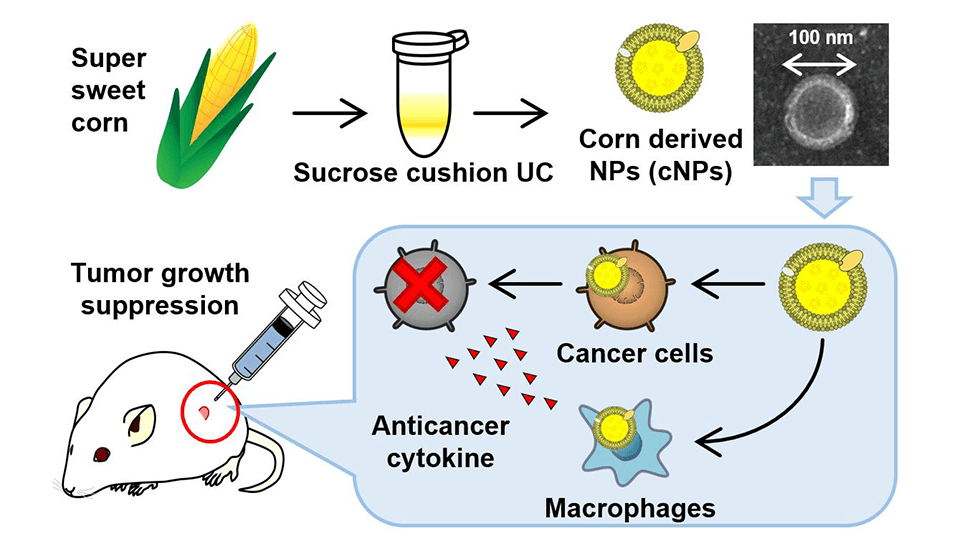Researchers have recently succeeded in developing innovative bio-nanoparticles derived from corn designed to tune into and destroy cancer cells, thanks to the body's own immune system
[Translation by Dr. Moshe Nachmani]

Nanomaterials have led to breakthroughs in the fight against cancer, and plant-derived nanoparticles have the added advantage of being cheap and suitable for mass production. These research findings are very encouraging, after it was proven that the method can work effectively in the treatment of mice with cancerous tumors. Moreover, no adverse side effects were reported in the studied mice.
Nanoparticles, which are particles with a size between 1 and 100 nanometers, have been proven to be particularly effective in many fields of science and technology, including types of medical treatment. However, synthetic nanoparticles are normally challenging and expensive to manufacture. Extracellular vesicles, which emerged as an alternative to synthetic nanoparticles, present many challenges in their mass production. Another option that has recently developed is plant-derived nanoparticles (NPs), which can be produced easily and in large quantities at relatively low costs. All these types of nanoparticles can contain bioactive molecules, including polyphenols (known as antioxidants) and microRNA and deliver drugs to target organs within our body.
Based on this knowledge, researchers from the University of Tokyo in Japan have recently developed bio-nanoparticles with anti-cancer activity, using corn as the raw material. The lead researcher, Professor Makiya Nishikawa, explains: “By controlling the physicochemical properties of nanoparticles we can control their pharmacokinetic activities within the body; Therefore, we wanted to examine the use of nanoparticles derived from edible plants. Corn is produced in large quantities around the world in its natural form as well as in its genetically engineered form. This is the reason why we chose this raw material for the benefit of our research." The research findings were recently published in the scientific journal Scientific Reports.
The team created a uniform mixture of sweet corn in water, then it was centrifuged at high speed, and finally filtered through a 0.45 micrometer hole. In the last step, the filtered samples were ultracentrifuged, obtaining corn-based nanoparticles with a diameter of 80 nanometers. In addition, these particles were also negatively charged at a level of minus 17 millivolts. In the next step, the researchers examined whether these particles are absorbed by different cell types. In a series of positive results, the nanoparticles were taken up by a variety of cell types, including cancer cells, macrophage-like cells and cells used to deliver targeted drugs to specific cancerous tumors. The results were amazing: out of the three types of cells mentioned above, the nanoparticles significantly inhibited only the growth of the cancer cells while selectively tuning into cancer cells. In addition, the nanoparticles were also able to encourage the release of TNF-α type cytokine, the same cytokine released mainly by macrophages, natural killer cells and lymphocytes - the three main components involved in our natural immune system which itself helps in the fight against cancer.
"The strong cytokine response measured was encouraging evidence of the role of the innovative nanoparticles in the fight against various types of cancer," said the researcher. In the next step, the researchers conducted experiments with the enzyme luciferase, which is sensitive to various biological reactions. The luciferase system revealed that the nanoparticles significantly suppressed the proliferation of cancer cells in laboratory mice. "By improving the properties of the nanoparticles and combining them together with anti-cancer drugs we hope to develop safer and more effective drugs for the fight against various types of cancer," said the lead researcher. In conclusion, the researchers said that: "These nanoparticles demonstrate excellent anti-cancer properties, they are simple to manufacture and inexpensive in terms of money. Moreover, there are no negative side effects involved, as we have demonstrated so far in mice."
